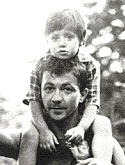I WAS STUNNED TO DISCOVER that the Bosnian War Crimes Commission had
investigated Gaga as a suspected war criminal. By coincidence, the head
of
the commission, a Muslim lawyer named Bekir Gavrankapitanovic, lived in
Gaga's building and knew my friend before the war.
"We have an expression in Bosnia," Gavrankapitanovic explained, "if you
want
to judge a man, see how he would govern for five minutes if given absolute
power."
In Grbavica, Gaga and other Serb fighters enjoyed sudden, complete power
over the Muslim civilians living among them and those across the lines in
Sarajevo. These were largely untrained, undisciplined troops, not
professional soldiers. There appear to have been few sanctions against
human
rights violations.
Under the weight of such authority, a man like Gaga has only the tensile
strength of his character to resist evil, like a suspension bridge
suddenly
shorn of its cables, fighting against gravity. Gaga's soul collapsed.
Gaga entered war's maelstrom and like millions of people in this century
did
not come out alive. But unlike many victims of war, his was very much a
voluntary journey, one that he could have quit at several key junctures.
Perhaps he did not have the courage to run away. Perhaps he thoroughly
enjoyed war, though this I doubt.
War has its own logic and momentum, it's own power and allure. As Trotsky once wrote, "you may not be interested in war, but war is interested in you."
In the end, Gaga was unable to reconcile two personae within himself. Fueled by his alcoholism, he fell to the stronger of the two. Gaga was not the only person who chose the mask of hate in Bosnia. So did many others--Serbs, Croats and Muslims. But they were not all equal, nor were they my friends.
I'll probably never sort out all the details of Gaga Bundalo's death. I no longer care if it was suicide or murder. Whoever pulled the trigger on that May evening three years ago ended a wretched, warped existence. I hate to admit it, but somehow I'm glad my friend is dead.

Return to Documentary Homepage

